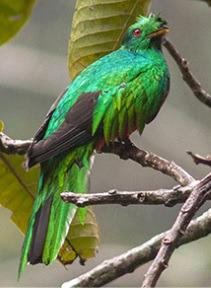当前位置:
X-MOL 学术
›
Funct. Ecol.
›
论文详情
Our official English website, www.x-mol.net, welcomes your
feedback! (Note: you will need to create a separate account there.)
Specialists and generalists fulfil important and complementary functional roles in ecological processes
Functional Ecology ( IF 4.6 ) Pub Date : 2021-04-26 , DOI: 10.1111/1365-2435.13815 D. Matthias Dehling 1, 2 , Pedro G. Blendinger 3 , Marcia C. Muñoz 4 , Eike Lena Neuschulz 5 , Matthias Schleuning 5 , Irene M.A. Bender 3, 5 , Katrin Böhning‐Gaese 5, 6 , Marta Quitián 5 , Francisco Saavedra 7 , Vinicio Santillán 8 , Daniel B. Stouffer 1
中文翻译:

专家和通才在生态过程中发挥重要和互补的功能作用
更新日期:2021-04-26
Functional Ecology ( IF 4.6 ) Pub Date : 2021-04-26 , DOI: 10.1111/1365-2435.13815 D. Matthias Dehling 1, 2 , Pedro G. Blendinger 3 , Marcia C. Muñoz 4 , Eike Lena Neuschulz 5 , Matthias Schleuning 5 , Irene M.A. Bender 3, 5 , Katrin Böhning‐Gaese 5, 6 , Marta Quitián 5 , Francisco Saavedra 7 , Vinicio Santillán 8 , Daniel B. Stouffer 1
Affiliation

|
- Species differ in their resource use and their interactions with other species and, consequently, they fulfil different functional roles in ecological processes. Species with specialized functional roles (specialists) are considered important for communities because they often interact with species with which few other species interact, thereby contributing complementary functional roles to ecological processes. However, the contribution of specialists could be low if they only interact with a small range of interaction partners. In contrast, species with unspecialized functional roles (generalists) often do not fulfil complementary roles but their contribution to ecological processes could be high because they interact with a large range of species.
- To investigate the importance of the functional roles of specialists versus generalists, we tested the relationship between species' degree of specialization and their contribution to functional-role diversity for frugivorous birds in Andean seed-dispersal networks. We used two measures for the specialization of birds—one based on the size, and one based on the position of their interaction niche—and measured their effect on the birds' contribution to functional-role diversity and their functional complementarity, a measure of how much a species' functional role is complementary to those of the other species.
- In all networks, there were similar log-normal distributions of species' contributions to functional-role diversity and functional complementarity. Contribution to functional-role diversity and functional complementarity increased with both increasing niche-position specialization and increasing niche size, indicating that the composition of functional roles in the networks was determined by an interplay between specialization and generalization. There was a negative interaction between niche-position specialization and niche size in both models, which showed that the positive effect of niche-position specialization on functional-role diversity and functional complementarity was stronger for species with a small niche size, and vice versa.
- Our results show that there is a continuum from specialized to generalized functional roles in species communities, and that both specialists and generalists fulfil important functional roles in ecological processes. Combining interaction networks with functional traits, as exemplified in this study, provides insight into the importance of an interplay of redundancy and complementarity in species' functional roles for ecosystem functioning.
中文翻译:

专家和通才在生态过程中发挥重要和互补的功能作用
- 物种在资源利用和与其他物种的相互作用方面不同,因此,它们在生态过程中发挥不同的功能作用。具有专门功能作用的物种(专家)被认为对社区很重要,因为它们经常与很少有其他物种相互作用的物种相互作用,从而为生态过程贡献互补的功能作用。然而,如果专家只与一小部分互动伙伴互动,他们的贡献可能会很低。相比之下,具有非专业功能角色(多面手)的物种通常不能发挥互补作用,但它们对生态过程的贡献可能很高,因为它们与大量物种相互作用。
- 为了研究专家与通才的功能角色的重要性,我们测试了物种的专业化程度与其对安第斯种子传播网络中食果鸟类的功能角色多样性的贡献之间的关系。我们使用了两种鸟类专业化的衡量标准——一种基于大小,一种基于它们相互作用生态位的位置——并测量了它们对鸟类对功能角色多样性的贡献及其功能互补性的影响,衡量如何一个物种的功能作用与其他物种的功能作用是互补的。
- 在所有网络中,物种对功能角色多样性和功能互补性的贡献存在相似的对数正态分布。对功能角色多样性和功能互补性的贡献随着生态位位置专业化和生态位规模的增加而增加,表明网络中功能角色的组成是由专业化和泛化之间的相互作用决定的。两种模型中生态位专业化与生态位大小均存在负交互作用,表明生态位专业化对功能角色多样性和功能互补性的正向影响对于生态位较小的物种更强,反之亦然。
- 我们的研究结果表明,物种群落中存在从专业到广义功能角色的连续统一体,并且专家和通才都在生态过程中发挥重要的功能作用。如本研究所示,将相互作用网络与功能特征相结合,可以深入了解物种对生态系统功能的功能作用中冗余和互补性相互作用的重要性。











































 京公网安备 11010802027423号
京公网安备 11010802027423号